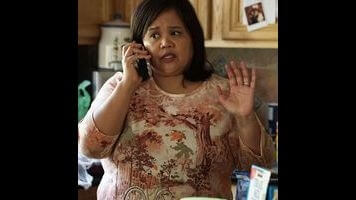A fantastic Baskets deftly balances sweet and sour

For all of its abrasiveness and melancholy, Baskets can be a very sweet show. Galifianakis doesn’t pretend that the life of Chip Baskets is an admirable one, nor does he shy away from the painful delusions that uphold his entire worldview, but he also relishes in Chip’s commitment to reaching for the brass ring in spite of all evidence to the contrary. This obviously doesn’t just extend to being a professional clown, but also a husband to a woman who obviously doesn’t love him, a son to an encouraging but disappointed mother, and in “Uncle Dad,” a part-time uncle for his two nieces. Naturally this requires some tolerance for Chip’s worst qualities—constantly dismissing Martha, a stubborn refusal to listen to others, general low-grade dickishness—but it helps that the creative talent clearly have a lot invested in the character, as well as the other people that surround him. Baskets may be on a left-field wavelength, but it’s positive qualities are universal.
“Uncle Dad” features two concurrent storylines that focus on playacting: Chip and Martha act as makeshift parents to Dale and Nicole’s kids while they’re out getting a good deal on a hutch, and Christine plays mother-in-law to a befuddled Penelope despite her tenuous marriage to Chip. Compared to the last two episodes, it’s relatively low-key, focusing more on oddball exchanges and situations rather than hitting the throttle on the tragedy, but it also manages to skillfully incorporate enough painful subtext to provide weight to the stories. Chip wants to finally do something right, and Christine wants Chip to be happy; both go about this indirectly and succeed in limited ways. It’s a little less strange than the last few episodes of Baskets (and this episode begins with Eddie sacrificing a rodeo bull and polling the rodeo clowns for which cut of the meat they want), but it’s also more emotionally direct in unexpected ways.
Let’s start with Chip and Martha who look after Sarah (Malia Pyles) and Crystal (Julia Gruenberg) and deal with their various emotional troubles at school. Sarah is fighting with her best friend who has turned all of her other friends against her, while Crystal performed a dance at school that provoked her classmates to laugh at her. They’re both common problems that many children face, but Chip goes about “solving” them in confrontational ways. Chip takes the whole “family” to Sarah’s friend’s house in order to resolve their conflict only to quickly bail on the plan when it gets out of hand quickly, but one gets the sense that the charade helps Sarah anyway. Though Dale may be a successful businessman in Bakersfield, his attitude towards his kids is condescending at best, but Chip at least listens to her and attempts to fix her problems, which is the gesture she really needed.
But it’s Chip’s advice to Crystal that really stuns in its emotional honesty. Crystal performs the dance to Chip and Martha and Chip quickly informs her that she’s a terrible dancer and that her peers were laughing at her, but that she can own those laughs by performing an even worse dance tomorrow. It’s clearly advice that comes from personal experience (one can reasonably assume that Chip’s childhood was not a good one), and though it’s brutal, it’s also exactly what Crystal doesn’t hear from her own father. “No matter what terrible thing happens in your life, it doesn’t matter because you’re in on the joke,” Chip tells her in the most openly heartbreaking line in the episode. For a few brief moments, Chip, Martha, Sarah, and Crystal are one happy family, sharing their feelings and eating hot dogs and rice. But as soon as Dale enters the house and begins barking at Sarah and Crystal to help their mother with the hutch, the illusion shatters, and Chip leaves openly embarrassed at his fleeting moment of levity.

 Keep scrolling for more great stories from A.V. Club.
Keep scrolling for more great stories from A.V. Club.